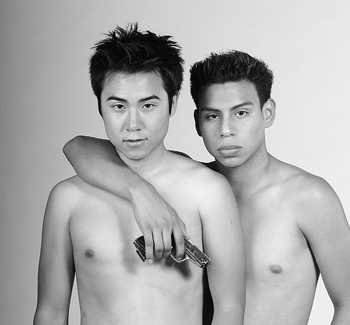Forced to survive on the street, two young men seek vindication
Jun Hee Lee plays the title role in “Ethan Mao,” as an 18-year-old boy who toils away at a Chinese restaurant run by his father. One day, the place gets robbed at gunpoint. Shortly afterwards, his father throws him out of the house after discovering a gay porn magazine in his room. To make ends meet, he becomes a hustler.
After a year on the streets, he meets Remigio (Jerry Hernandez), a fellow hustler and drug dealer with a heart of gold. Remigio lets Ethan stay with him. The two fall in love, although they don’t sleep together. Ethan wants to get his possessions back from his father’s house. Knowing that his family will be out of the house on Thanksgiving, he and Remigio plan to go there to pick up his belongings, as well as a necklace that belonged to his late mother.
Unfortunately, things don’t go too smoothly—Ethan’s father returns while he and Remigio are rifling through the house. They wind up holding Ethan’s family hostage.
“Ethan Mao” is the sweetest film you’re likely to see in which a man non-fatally shoots his father. Hostage-taking and hustling don’t usually call for tenderness, but Lee emphasizes his characters’ essential innocence. Not only do Ethan and Remigio stay chaste, they don’teven kiss until the film’s final minutes. (Granted, it’s a hot, passionate one.)
Lee’s performance is fine when he simply has to express a wide-eyed daze, but he’s less convincing when he starts toting a gun. Ethan’s anger feels like a pose, and his mood changes are sometimes baffling. Hernandez is slightly better at combining street smarts and earnestness, but even he looks like a boy band member trying to act gangsta.
The back story emphasizes absent mothers. Ethan mourns the loss of his mother in equal proportion to his hatred for his stepmother Sara, whom he blames for showing his porn to his father. Remigio has come to the West Coast in search of the woman who gave him up when he was a toddler. Sara is a grotesque self-parody, telling Remigio “I hope you two get AIDS and die,” and imagining herself on a talk show saying “my stepson is a homosexual and psychopath.” Ethan accurately describes her as a “backstabbing bitch.”
Ethan’s immigrant father is a traditional, conservative, Asian man straight out of the hall of stereotypes. Ethan’s brother and stepbrother fare somewhat better, but they’re fairly underdeveloped characters.
Lee’s direction outshines his writing. “Ethan Mao” combines two formats: digital video and 35mm. The early scenes, shot outside the Mao family home, are shot on DV and edited in an MTV-influenced style, full of quick cuts, titled angles and dance beats on the sound track. The footage inside the house, shot on film, is far more restrained. Many filmmakers would adopt the opposite approach, trying to jack up the intensity level with visual trickery once Ethan takes his family hostage, but Lee relies on acting and narrative to fill in the blanks.
However, “Ethan Mao” feels like a film that crams together too many ideas. It’s a love story, hostage drama and exploration of a dysfunctional family, all rolled into one. Unfortunately, the results don’t really gel. The film’s heart lies in the relationship between Ethan and Remigio. At its most interesting, it puts a gay, Asian-American twist on the notion of the outlaw couple, although it’s not a road movie. Lee is definitely trying something different, which makes his failures all the more disappointing.
Pretty strong visually, “Ethan Mao” is sabotaged by bad casting choices, a sensibility too gentle for its own good and a script more worthy of a student film.
gaycitynews.com


































